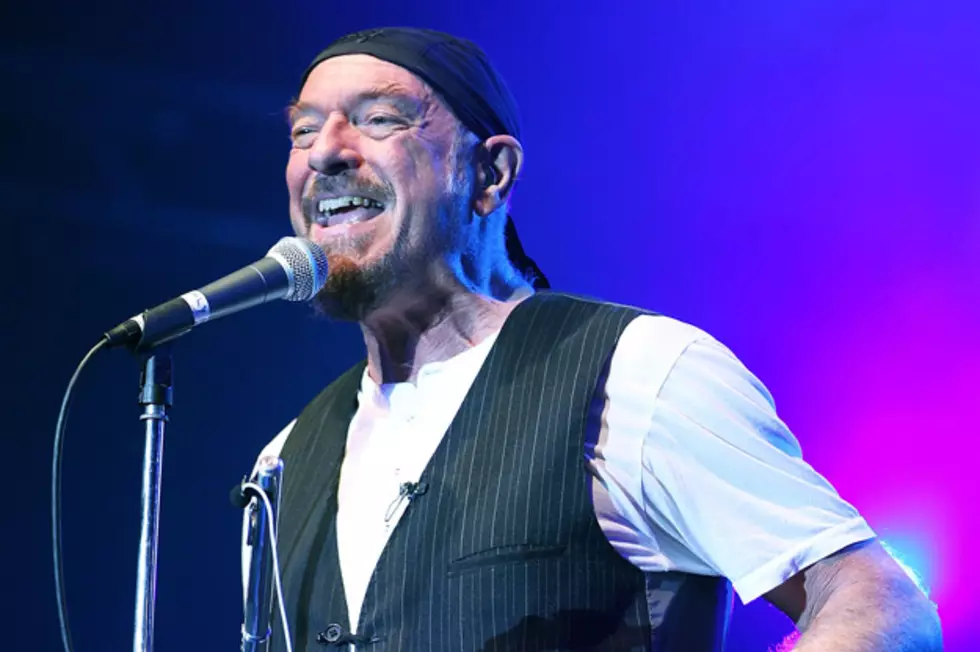
Ian Anderson ‘Would Never Say That It is the End of Jethro Tull’
Fans of Jethro Tull are looking forward to Ian Anderson bringing them up to date on the fate of Gerald Bostock, fictional star of the band’s seminal 1972 album ‘Thick as a Brick.’ Tull frontman and founder Anderson has not only updated the story but also put together a sequel album, ‘Thick as a Brick 2,’ and a concert tour which will include performances of both ‘Brick’ albums.
Although Anderson has been doing most of his talking via a series of self-interviews on the internet, he recently spoke to Ultimate Classic Rock from his home in England, where he talked about the inspiration for this new chronicle of Gerald’s later life, the new tour and the future of Jethro Tull.
It must have been odd to revisit something you originally wrote when you were in your 20s, to put yourself back in that mindset.
I didn’t have to put myself in any mindset regarding ‘Thick as a Brick.’
It was a purely intellectual proposition…after considering the sequel to ‘Thick as a Brick’ during the last few years and…coming up with the answer as to what had befallen [the album's fictional character] Gerald Bostock. And, of course, the implication of what could befall any of us 40 years down the line. Shifts in luck and intervention along the way might have changed our lives completely. As I look back on my own life [I can] imagine my fortunes might have turned out completely different. Maybe it’s some kind of personal karma or some sense of fate or outcomes, maybe life’s conclusion is that it brings you back to the inescapable place that you were going to get to anyway– so that as a notion became the concept of the album.
I didn’t, obviously, want to just restrict it to one possible course of life for the young school boy so I made him a preacher, a soldier, an ordinary man who runs a little corner shop and plays with his toy trains…a despicable fat-cat investment banker, and so we had a few different possibilities. In fact, on the album cover I chose he would be represented as a retired politician.
Is any of that biographical?
There are lots of things all of us might have done, and I know that applies to me so I try to put in a little background, but not in too biographical of a way, just for little ideas and little examples. I think that is what the listener will get from it, [being able to] relate some of these things perhaps to passages in their own lives.
And of course younger fans — a growing body teens and early 20s [especially in Latin cultures] are following progressive rock even though they weren’t alive at the time [it began] — early on in their lives [they face] thought provoking choices ahead of them even when they are not deliberate choices that they have to react to. I try to put a little thought here [to make this] unashamedly a conception and intellectual proposition offered in a pop or rock record. That’s an ugly word but somebody has to use it!
The latest edition of the [mock] newspaper that goes with the project is certainly funny, though. What is this fascination with proctologists?
Oh, thank you for reading it. A lot of it is really school boy humor. I wanted to make it a little light, whimsical, humorous. Some of the album is dark; it’s not all fun and laughter. It is quite serious and a little bleak here and there.
When do we get to hear some of it?
You’ll have to wait a little longer, ’til April. The record company wanted to go public with the idea of it sooner rather than later. We had our arms twisted to make it apparent it is a new record and what it is about but in terms offering up the music that is a few weeks away on our web site.
The big question is always, how do you write? What was the process of writing this?
One piece of music I wrote a few years ago was rewritten and reworked to have a function on this album. It’s called ‘A Change of Horses,’ an instrumental piece [originally] written for flute and sitar. It’s a tune I thought would be nice to bring into play and I wrote words to apply in this particular context, pressed it into service for this record. Another piece I prepared also early last year which we performed in concerts last year. We were trying to out on stage to see how the audience took to it without telling them it’s a track for a new album or anything about it.
The writing took place in February last year, once I had the conceptual side of it written out on a sheet of paper — write songs, sequence of events, not songs, but sections of music…[I wrote it] in a continuous flow, where I could reiterate musical ideas, develop ideas, reprise ideas. There are a number of themes on the record, which appear a few times at different times. As for the actual writing of the lyrics, the starting point for it all was pretty much in a couple week period, perhaps even less than that, perhaps 10 days, when I wrote all the lyrics. As I wrote the lyrics [I developed] ideas for melodies and chord sequences. It began as words on pages and was quickly followed by musical reality. After a couple week it was plotted musically and lyrically.
We recorded it pretty much live; there is just one electric guitar track on whole album, not lots and lots of overdubs. A lot of it is quite live. Every day, I’d come in with a few changes and amendments, some were quite big ones – we would change and fix and subtract a few ideas along the way. It was quite exciting.
It keeps you alert, keeps you feeling engaged with the project, not just playing what’s written on the score. It keeps you thinking on your feet as you’re going through the process.
The musicians [who played on the project and were interviewed for a promotional DVD] said they had a good time doing it, they enjoyed the work. They were full days but everyone got a kick out of those days. It was consistent work, six days a week…
I am pleased the musicians are pleased because you don’t want to just be a harsh task master who beats them into submission. I am happy that they all had a good time and are looking forward to playing it on stage, too.
How did you choose the musicians for this project?
They are the ones in my address book. They have all played concerts as Jethro Tull and are familiar with lots of the repertoire of Jethro Tull through the years. Also, they’re the guys that played with me on my frequent solo concert tours — acoustic, string quartet, orchestral, rock shows. I do more shows these years as Ian Anderson than as Jethro Tull. These are guys that I have worked with, well most of them, for 10 years.
So tell me about the show?
It would be great if you could tell me something about the show! I am just having a lot of conversations about it with advisors. I have a pretty have a good idea how it is all going to be in terms of screens, content and video but there’s a lot of work we have to do in the next month. We have a busy pre-production period coming up [to work through] audio specifications, lighting specifications, video specifications. I have written a bit of that but I have a lot of work ahead of me to finish it. It’s quite a big, big piece of work.
I’m sure you’re not surprised to hear that many fans are wondering if this is the end of Jethro Tull. I’ve read different people’s comments about what defines Jethro Tull. How do you define it?
I don’t define it. When I get on the stage I have to remind myself ‘What am I today?’ What does it say on the ticket? When I am on stage, nothing changes. I am on stage doing my music. For me it feels the same whether it is billed as Ian Anderson or Jethro Tull. For the audience the reaction will be determined by the musicians on the stage.
There are certain countries in the world when I got out as Ian Anderson that I can expect more consistently attentive audiences. There are some places in the world where Jethro Tull will bring out of the woodwork a few hard drinking [men] who have to whistle and shout out “ROCK AND ROLL!” So that can be a bit of hazard.
I resolved many, many months ago that going out to do ‘Thick as a Brick,’ I would not go out under the name Jethro Tull. The experience I had [with Jethro Tull] doing ‘Thick as a Brick’ in 1972 was sufficiently depressing that I don’t want to risk that again.
I am afraid this one, from the word go, was always primarily billed as Ian Anderson or Jethro Tull’s Ian Anderson. I don’t think it would be appropriate if I went out under the name Ian Anderson to expect [long-time lead guitarist] Martin Barre to just be one of the musicians.
Do you see a future for Jethro Tull?
Martin, Doane [drummer Doane Perry who joined the group in 1984, replacing Gerry Conway] and I had a long talk last summer. We decided it’d be a good time for me to pursue a couple of my projects this year. I have a couple other projects I’m working on this year as well. And Martin Barre, for example, is engaged in a bunch of other musical projects, playing with some other people, some other line ups and with a new band he has put together [Martin Barre's New Day] to play some of the early Jethro Tull repertoire that he feels may have been neglected over the years.
I certainly would never say that it is the end of Jethro Tull. In fact, I spoke to Martin about getting together some dates actually with him and me for an acoustic venture at some point.
But in terms of the near future, we don’t have any Jethro Tull shows scheduled in 2012 so far. If something came up and looked right and I wanted to do it under the name Jethro Tull, I’d call the other guys and see if they wanted to do it, too. Sometimes they say yes and sometimes they say no. I can understand that. It happens sometimes things I want to do other people don’t want to do. There have been some occasions in past [when I played] Jethro Tull concerts without Martin Barre and without Doane, because he lives in L.A. and it doesn’t make sense for him to fly to Helsinki for one show.
For more information about Ian Anderson, ‘Thick as a Brick,’ and, of course, Jethro Tull, check the band’s website.
More From 105.7 The Hawk




![Guess Which Legendary Musician is Part of a New Super Group? [VIDEO]](http://townsquare.media/site/392/files/2012/03/Gene-Simmons-All-Star-Band-1.png?w=980&q=75)
![Scorpions Release 2012 Summer Tour Dates [VIDEO]](http://townsquare.media/site/392/files/2012/03/The-Scorpions.jpg?w=980&q=75)




